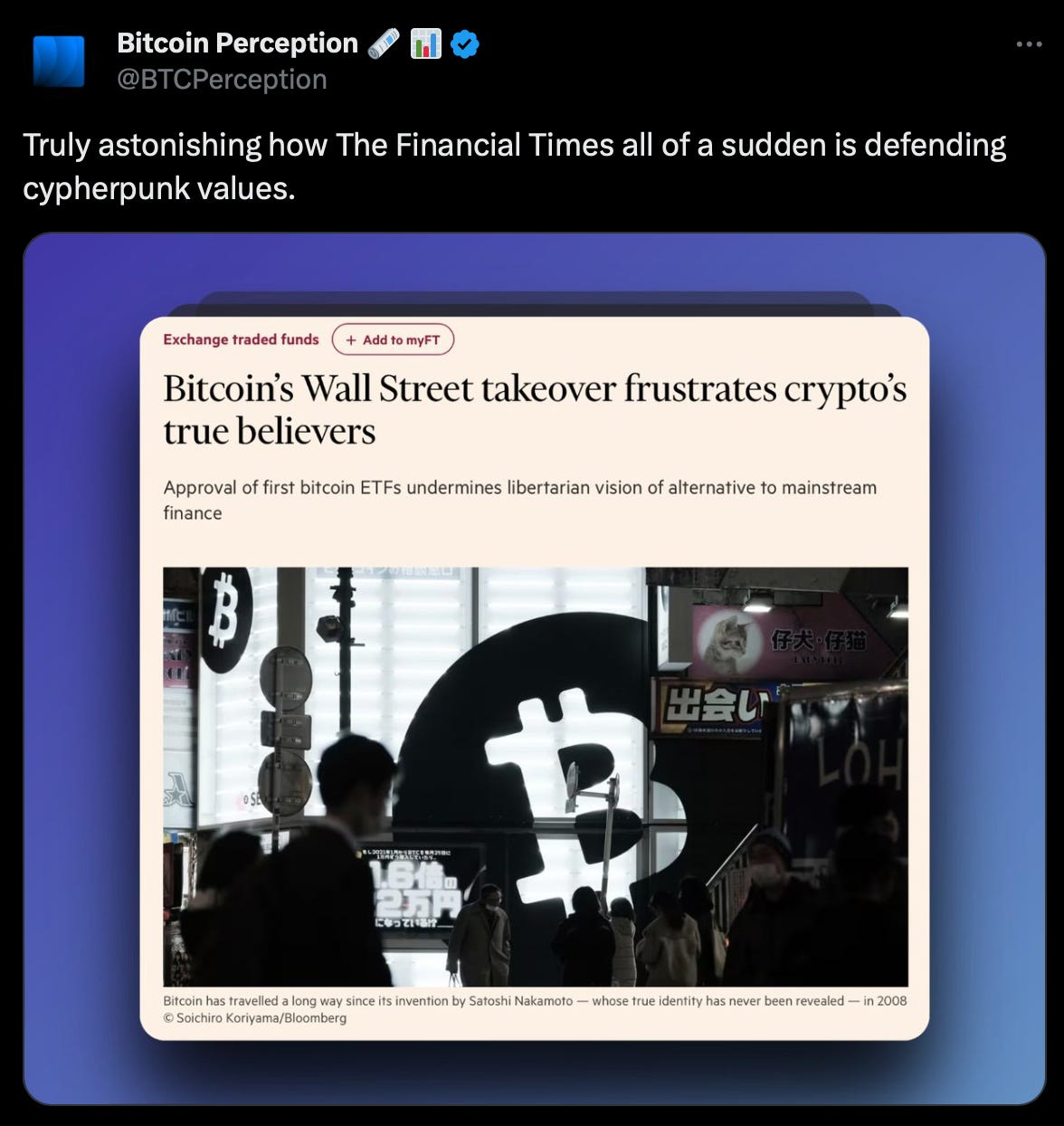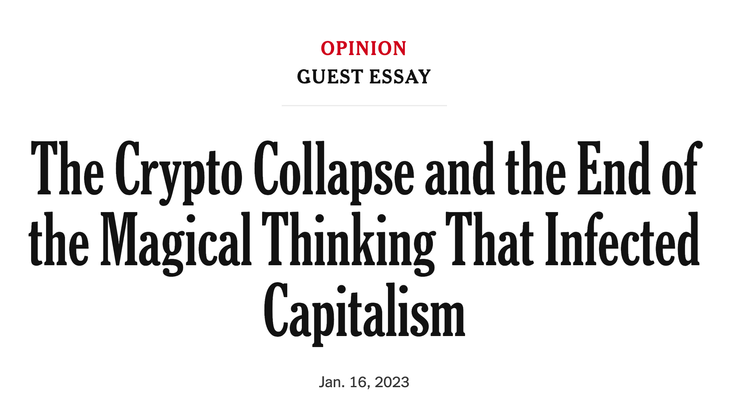Bitcoin ETF: The Movie

Leading companies like Swan, Galoy, Braiins, Blockstream, and BTC Media rely on these weekly reports for insights.
Join them and many others in discovering how mainstream media is shaping the narrative around Bitcoin.
So last week, I promised you a deep dive into the shenanigans that was the ETF frenzy, which I’m sure you followed at some level.
This wild ride has no doubt been a fascinating media spectacle to watch, and while I’m personally glad the approval circus is over, the path there was nothing short of a movie.
Let’s jump right into it.
Act One: The Lead-Up
As the SEC geared up for its big Bitcoin ETF decision, the financial press was all over the 'fee war' among asset managers.
This wasn't just a skirmish over numbers, but a full-blown battle for market dominance as Bitcoin edged closer to mainstream acceptance.
As Scott Chipolina, FT’s Digital Market Correspondent, remarked;
“Because the products are similar — they are all designed to hold bitcoin — fees and to a lesser extent firm branding will be a key part of how the applicants distinguish themselves in a crowded market.”
Loads of media outlets were covering this, capturing the cutthroat competition through many pieces.
But then, there's The Guardian, always taking the pessimist route. Right in the middle of this financial turning point, they chose to zero in on 'Bitcoin Rodney'.
Yes. Bitcoin Rodney.
Instead of highlighting the ETFs' impact and history being made, The Guardian churned out pieces on a Bitcoin scam in Delhi, a total of four stories on Rodney, and even an opinion piece shrugging off "Bitcoin-tracking ETFs are near-useless outside of speculation":

The Guardian's selective narrative stood in stark contrast to the wider media frenzy about the ETF approval. But, looking back at history, this isn't out of character for the British outlet, either - so no surprises there.
But I can’t shake the fact that these attempts are just so sad.
They are not bringing their best.
Act Two: The Fake Approval
But then came the plot twist: the fake SEC approval tweet, sending waves through the media landscape.
It was no shocker that everyone from Twitter/X regulars to high-profile figures like Edward Snowden jumped into the fray. In the middle of all this, Bitcoin Perception data hit a new high in daily coverage.

But let's talk about the standout piece in this second act: The Financial Times' "Bitcoin ETFail."
To be frank, it's rare to come across an article that tries so hard yet misses the mark. The piece was dripping with a level of pettiness and immaturity that you just don't expect in serious financial journalism.
Take a moment to skim through it, and you'll see what I mean. The quality is, at best, questionable, leaving you wondering about the standards of commentary in some corners of the financial press.
But the real turning point came with the SEC's actual approval of Bitcoin ETFs.
Act three: The Real Approval
This was the kind of news that not only made waves but created a tsunami in the media world, eclipsing the previous day's all-time high in coverage.
What caught my eye, though, was the noticeable shift in narrative from some of the usual skeptics.
We're talking about more balanced perspectives emerging from the likes of The FT, The Washington Post, and, can you believe it, The Guardian!
However, this didn't stop Ken Sweet, a reporter I like to regard as a hitman for hire, from posting four hit pieces across three different outlets.
The guy was on a tear, churning out four critical pieces in quick succession – one for The Boston Globe, a couple in The Independent, and another in Time Magazine.
Also, in one of the weirdest moves - The Financial Times suddenly protested against the ETF for going against cypherpunks values.
Truly something you don’t see every day!

Shortly after the ETFs began trading, key figures like SEC Chair Gary Gensler, BlackRock CEO Larry Fink, and ARK Invest CEO Cathie Wood gave us some quotables for posterity.
These are the kinds of quotes that end up in history books:
Cathie Wood: “Bitcoin is a public good”
Larry Fink: “Bitcoin is an asset class that protects you”
Gary Gensler: “Bitcoin is highly speculative and volatile”
But that was not the end of the story.
Final act: Full Circle - BTC Price Tanking
In a twist that seemed almost scripted for dramatic effect, Bitcoin's price did a dramatic about-face following the ETF approval, wiping out the gains it had racked up in the run-up to the launch.
There couldn’t be a more Bitcoiny way of playing this story out, to be honest.
As if the SEC’s Twitter/X account getting compromised wasn’t lols enough, the price tanked not long after trading hours had started, giving all the newcomers a stark reminder of the world they just entered.
Now, you'd typically expect the mainstream media to jump on this with a barrage of doom-and-gloom stories as Bitcoin's price stumbled out of the ETF gate. But here's where things take an interesting turn: the coverage was, surprisingly, pretty even-handed.

To me, their choice to maintain balanced coverage sends a different message instead:
'Embrace volatility' (like CNBC)
Couldn’t ask for a better ending.





